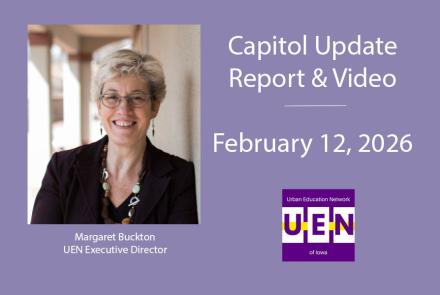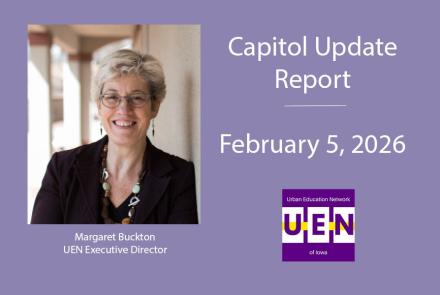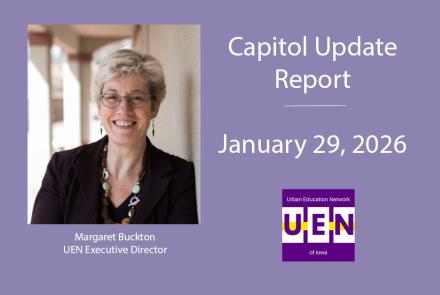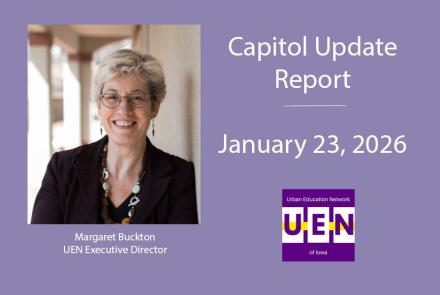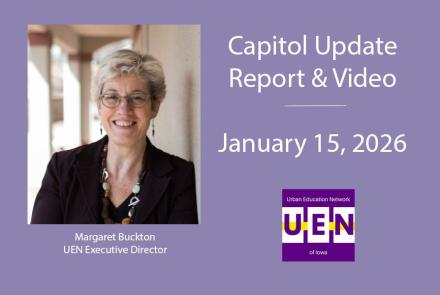Capitol Update - January 26, 2024
UEN Legislative Update
January 26, 2024
Download the Printable Version of this Report
This UEN Weekly Report from the 2024 Legislative Session includes:
- Next Steps on Governor’s Teacher Salary and AEA Overhaul Proposal
- Federal Office of Special Education: Iowa’s Status as “Needs Assistance” background
- Committee Action
- Subcommittee Action
- Bills Introduced
- Advocacy Actions
- Links to Advocacy Resources
Next Steps on Teacher Pay and AEA Overhaul Governor’s Bill:
An amendment to HSB 542 and SSB 3073 from the Governor’s office regarding AEA and special education overhaul is expected soon. UEN has asked for several improvements to the bill, including:
- An evaluation of Iowa’s model of identifying students with disabilities, services provided, and the impact on student outcomes and costs, recommendation for system improvement and best practices in other states.
- Allow AEAs to deliver educational and media services that districts want and depend on.
- Restore $32 million in media services funding. Allow districts to use that money to provide media services by contracting with AEAs or others as determined by the district. We have no objection to relieving the property tax levy amount that currently funds media services flow through to the AEAs, as long as another source of funding is found.
- Eliminate the timelines in the bill for decisions by April 30 and the minimum two-year commitment for districts to contract with AEAs for special education services.
- Keep Child Find and Early Access with the AEAs.
- Start small with the new Division of Special Education at the DE. Require their first task be to get Iowa in compliance with federal special education requirements (see the article below about Iowa’s “needs assistance” federal status) and make recommendations to change AEA accreditation, over which the DE and State Board of Education already have authority. If the Governor and legislature insist on school districts keeping AEA special education flow through and contracting for services, start small and focus initially on districts with a school on the targeted or priority list for special education gap or nonproficiency. Require the school district, AEA and DE to collaboratively devise a plan for improvement and give the district equal power in determining what is best for their students. We remain concerned that the job of DE Director authority over all AEA FTEs and salaries, approval of all services, and other duties contained in the original draft of SSB 3074 and HSB 542 is too much concentration of power and stakeholders do not yet have trust or confidence in the DE’s capacity to do this job well with so many other things on the DE’s plate (new ESSA state plan, for example).
- Protection for special circumstances/services that AEA can provide that require regionalization, including residential facilities with student adjudicated for services, Therapeutic Classrooms, and crises services.
- We support AEAs having control over their property and equipment, but if policymakers insist on the Department of Administrative Services (DAS) oversight or ownership, any property or equipment that local districts provided to AEAs should be returned to the school district if they want it.
- Lastly, we have asked for clarity on the numbers and estimates shared with school districts and mentioned in the Governor’s Condition of the State address. This includes the local district financial impacts, the reference to $529 million in AEA funding, and the adjusted average amount Iowa spends on students with special needs that is stated as $5,331 more than the national average expenditure. Understanding where the Governor’s numbers come from and how local leaders can trace them back to their own financial documents will build trust and restore some faith in the experts at the state level.
UEN is registered as undecided on the bill and is looking forward to amendments and legislative discussion. See the Jan. 12 UEN Weekly Report for a complete summary of HSB 542 AEA Overhaul and Teacher Pay Minimums. Please let us know what member suggestions you might have to the bill to further improve outcomes for students with special needs and provide needed services for Iowa school districts.
Iowa’s Status of “Needs Assistance” from the Federal Office of Special Education Programs (OSEP)
OSEP provides oversight and suggestions for improvement for states regarding compliance with federal Individuals with Disabilities Act (IDEA) requirements. Iowa is among the 26 states/territories in their second year of “Needs Assistance” status for FFY 2022. See the list posted on the federal DOE website here: https://sites.ed.gov/idea/idea-files/2023-determination-letters-on-state-implementation-of-idea/
IDEA details four categories for the Secretary’s determinations. A State’s determination may be: 1) Meets the requirements and purposes of IDEA; 2) Needs assistance in implementing the requirements of IDEA (Iowa’s current status); 3) Needs intervention in implementing the requirements of IDEA; or 4) Needs substantial intervention in implementing the requirements of IDEA.
For States that received a determination of “needs assistance” for two or more consecutive years, the Federal DOE must take one or more enforcement actions, including, among others, requiring the State to access technical assistance (this is the action stated in the OSEP letter to Iowa), designating the State as a high-risk grantee, or directing the use of State set-aside funds to the area(s) where the State needs assistance. If a State receives a determination of “needs intervention” for three or more consecutive years, the Federal DOE must take certain enforcement actions.
Iowa’s annual report for FFY 2021, including indicators of required actions and DE’s responses (Submitted April 27, 2023), is found here: https://sites.ed.gov/idea/files/IA-aprltr-2023b.pdf
The AEAs are mentioned as providing support to districts and oversight 87 times in this document. In the area of Monitoring, the State’s response to the federal government states:
Monitoring - Area Education Agencies (intermediate agencies). The SEA annually conducts desk audits for each AEA and follows up with accreditation visits if determined necessary. During this visit AEA documents are reviewed and internal (AEA staff) and external (Staff from school districts served by the AEA) interviews are held that relate to the agency’s five-year Comprehensive Improvement Plan and the services the agency provides in accordance with the eight required standards and one optional standard outlined in Chapter 72 of the Iowa Code. During the accreditation process, the special education services the agency provides are a part of each of the eight required standards. A targeted interview is held with special education staff; topics discussed during this interview include the agency’s State Performance Plan indicator data, LEA (district) special education procedural compliance data, the AEA’s general supervision responsibilities and other AEA data used by the Iowa Department of Education to make the accreditation determination regarding the agency.
There are two specific instances of the State indicating continued need for AEAs to implement improvement strategies through the State’s Systemic Improvement Plan:
“Provide a summary of the next steps for each evidence-based practices and the anticipated outcomes to be attained during the next reporting period.
Continue to support AEAs in implementing the three SSIP strategies of the SSIP Logic Model related to continued implementation and scale-up of SDI Literacy. b. Ensure fidelity of AEA-provided professional development delivery and coaching support to new districts. c. Use of professional learning materials and supports for instructional practices and system coaches across the system.
Does the State intend to continue implementing the SSIP without modifications? (yes/no)
YES
If yes, describe how evaluation data support the decision to implement without any modifications to the SSIP.
Continue to support AEAs in implementing the SSIP, the current evaluation data sources are identified to be most relevant to SSIP and being collected systematically, they are feasible to track, report and use for evaluation of implementation. Those evaluation data evaluated the progress the AEAs has made on implementing SSIP and indicated that the target of implementation for this year was met.”
A letter from OSEP to Iowa’s DE Director, Chad Aldis, dated June 23, 2003, indicates our status for compliance with Part B of IDEA is found on their website here: https://sites.ed.gov/idea/files/IA-aprltr-2023b.pdf
Committee Action
HSB 571 State Academic Standards: removes the requirements that the State Board of Education adopt rules to establish academic core standards, and instead, requires the state BOE to adopt the standards. Makes prior rules effective until rescinded. See SSB 3045. Approved by the House Education Committee unanimously and moves to the House Calendar. Awaiting assignment of a new bill number. UEN supports.
HF 2150 Transitional Coaching by Education: strikes the requirement that a person seeking a transitional coaching authorization complete a course on professional responsibilities developed by the BOEE. Formerly HSB 570. Approved by the House Education Committee on party lines. Assigned to the House Calendar. UEN is undecided.
HF 2151 BOEE Investigation Reporting by Education: requires the BOEE to include the number of investigations of school employees who are not licensed or holders of certificates or authorizations that are referred to law enforcement in its annual reports. Includes protections for personal information. Formerly HSB 566. Approved by the House Education Committee unanimously. On the House Calendar. UEN supports.
HF 2152 Commission on Education Leadership and Compensation Reports by Education: strikes the reporting requirements for the Commission on Education Leadership and Compensation to the DE, Legislature and the Governor. Successor to HSB 569. Moves to the House Calendar. UEN is undecided.
HF 2154 Printed Report Cards by Education: requires public schools to give or mail a printed report card to parents each semester or trimester. Allows the school to give the printed report card to the student for delivery to the parent. Successor to HF 2002. On the House Calendar. UEN is undecided.
Subcommittee Action
HSB 520 Therapeutic Classrooms: allows the transfer of remaining balance for therapeutic classroom transportation to the therapeutic classroom grant fund. The Subcommittee of Reps. Nordman, Collins, Ehlert met and recommended moving the bill forward to the full committee. See SSB 3044. UEN supports.
HSB 564 BOEE Statute of Limitation for Inappropriate Relationship Complaints: removes the statute of limitation for such complaints. Subcommittee of Reps. Boden, Gustoff and Kurth recommended moving the bill forward to the full Committee 3-0. See SSB 3050. UEN supports.
HSB 585 Start Date: allows schools to start in the Fall no earlier than the Monday in the week in which Aug. 23 occurs. The Subcommittee of Reps. Johnson, Buck and Gehlbach recommended moving the bill forward to the full Committee 3-0. UEN is registered in support.
HSB 586 Character Education: requires public school districts, but not private schools, to teach explicit character education in elementary and secondary school. The Subcommittee recommended indefinite postponement (the bill does not move forward). UEN is opposed.
HF 2056 Childcare Supervision by Teens: requires DHHS to amend administrative rules to allow employees or substitutes who are age 16 or older without additional supervision to care for children up to age 5 in a childcare setting, as long as there are two other adults aged 18 or over employed by the child care center present. Applies to child care centers defined in Iowa Code Section 237A.1. The Subcommittee of Reps. Wood, Baeth and Best recommended moving the bill forward to the full Health and Human Services Committee 2-1. UEN is undecided.
HF 2062 Open Meetings and Public Records by Mohr: increases the penalty for open meetings violations to $5,000 per occurrence. Requires a locally elected official who violates the open meetings law a second time to be removed from office by the County Attorney. Requires local governments to provide training and requires board members to participate in training for open meetings compliance. The Subcommittee of Reps. Siegrist, Bossman and Zabner recommended moving the bill forward to the full State Government Committee, 3-0. UEN is registered as undecided and suggested an amendment to broaden opportunities for training.
HF 2081 Agriculture Classes as Science by Jones: allows High School agriculture classes to count toward offer-and-teach science curriculum requirements in schools. Assigned to the House Education Committee. A Subcommittee of Reps. Ingels, Hora and Cahill met and recommended moving the bill to the full committee, with two votes in favor. UEN is undecided on the bill.
SSB 3045 Core Standards Process: removes the requirement that the State Board of Education change academic core standards through the administrative rules process. The bill amends Iowa Code Section 256.7, subsection 26, paragraph a. Subsequent subsections of the statute further direct the state board of education and DE's process. Subsection b mandates an inclusive process including stakeholders and subsection c prohibits the State BOE from requiring a specific curriculum, textbooks or materials, leaving that authority to the local school board. A Subcommittee of Sens. Green, Westrich and Quirmbach recommended moving the bill forward. The bill is in the Senate Education Committee. UEN supports. See HSB 571 approved by the House Education Committee, which is awaiting a new bill number.
SSB 3069 Teaching Reading by Rozenboom: requires beginning July 1, 2026 that districts include evidence-based early reading instruction that follows scope and sequence and that is direct, systematic, explicit, responsive and consists of 1) phonics including decoding and encoding and instruction in wiring, 2) phonemic awareness and phonological awareness, 3) fluency, including oral language development, 4) vocabulary and 5) Comprehension, including building background knowledge. Also prohibits, beginning July 1, 2026, the use of the three-cuing instructional model designed to teach students to read based on meaning drawn from context, structure and syntax, visual cues and pictures, or memory. The Subcommittee of Rozenboom, Donahue and Evans recommended moving the bill forward to the full committee, 2:1 UEN is undecided, but with a clarifying amendment regarding the prohibition of certain components of instruction to apply to decoding and all use of some of those strategies if appropriate for an individual student, UEN will be supportive.
SSB 3072 Charter School Extracurriculars by Rozenboom: allows a student enrolled in a virtual charter school to participate in up to two co-curricular or extracurricular activities per semester offered to children in the student’s grade or group and sponsored by the district of residence under the same conditions and requirements as the students enrolled in the district of residence. Allows but does not require the resident district to approve the student’s participation in additional activities. Requires the student to comply with the district’s eligibility, conduct, and other requirements of participating students. Also allows but does not require school districts to have agreements with charter schools for activities that the charter school does not provide for their students. The Subcommittee of Sens. Westrich, Gruenhagen and Quirmbach recommended the bill move forward to the full Education Committee. UEN is registered undecided on the bill and supports and amendment to have funding for the two activities modeled on the existing process for resident student participation if open-enrolled into a virtual public school.
SF 2047 School Vans by Dawson: Excludes vehicles with a capacity of no more than 12, including the driver, from the definition of school bus and allows such vehicles to be used to transport students for activities and other matters, subject to current rules on school vehicles. Requires the DE to adopt rules on the use of vehicles modified to accommodate wheelchairs, with or without a ramp. The Subcommittee of Sens. J Taylor, Green, and Trone Garriott recommended the bill move forward to the Full Education Committee. UEN supports.
SF 2005 High School Athletic Team Sharing: allows school districts and nonpublic schools in a county that borders a school district in another state to share high school athletic activities if there are not sufficient students registered to participate in the activity to form a team. The school district or nonpublic schools involved must have a 28E agreement and apply by April 30, in the year prior to participation, to the appropriate athletic conference for approval. If denied, the schools may appeal to the Iowa State Board of Education. The team may participate in either Iowa or the bordering state’s contest. A Subcommittee of Sens. Gruenhagen, Cournoyer, and Trone Garriott recommended moving the bill forward to the Education Committee. UEN is undecided.
SF 2027 Human Growth/Development Courses: requires districts to make instructional materials and curriculum available to parents, including the process for requesting review of such materials and requires parents to provide written consent acknowledging the receipt of instructional materials before the students may be enrolled in such courses or conferences including human growth and development content. A Subcommittee of Sens. Rozenboom, Quirmbach and Salmon recommended moving the bill forward to the Education Committee 2-1. UEN is opposed. See HF 2138.
New Bills Introduced
HSB 597 Public Officer Bond: allows a public officer to purchase an insurance policy in lieu of posting a bond. Requires the policy to substantially meet the bond requirements. Allows for reasonable expenses of the insurance policy to be paid by the local government to the extent the expenses of the bond would be covered. Allows an officer who fails to post a bond to be suspended for failing to do so and to be removed after a reasonable time if the bond is not posted. A Subcommittee of Reps. Golding, Cooling and M Thompson is assigned. The bill is in the House Local Government Committee. UEN supports the bill.
HF 2139 School Pronouns by Stone: prohibits schools and charter schools from disciplining employees, contractors, or students for the use of a legal name or the failure to use a personal pronoun. Allows an employee who is terminated to sue for reinstatement and to seek civil damages in three times the amount of back pay. The bill is assigned to the House Education Committee. UEN is opposed.
HF 2146 Operational Sharing Calculation to Exclude SROs by Bossman: excludes the weighting for sharing a school resource officer, which is equivalent to two pupils, from the calculation for the maximum amount of supplementary funding weighting of 21 students that a school can receive. UEN is undecided.
HF 2147 Cannabidiol Administration at School by Lohse: requires public and private schools to have policies that allow a school nurse to give a broad-spectrum cannabidiol product to a student in accordance with written instructions from a parent. Assigned to the House Education Committee. UEN is undecided.
HF 2158 Student Voter Registration by Staed et all: requires school boards to allow 17-year-olds to register to vote on the fourth Tuesday in September and on one other day. Requires the county auditor or commissioner of elections or a designee to conduct the registration. Requires schools to report on registration activities to the DE. See HF 165, SF 205. UEN is undecided.
SSB 3112 Educational Land Sales: prohibits various government bodies, including school districts, from adopting or enforcing an ordinance that prohibits the lease or sale of the property to an educational institution planning to offer educational services. Gives educational institutions the right of first refusal on such properties. Prohibits the enforcement of deed restrictions or refusal to sell to an educational entity. Defines educational institutions as public or nonpublic school, an institution of higher learning under the control of the Board of Regents, a community college or an accredited private school or college. A Subcommittee of Sens. Green, Webster, and Winckler is assigned. The bill is in the Senate Local Government Committee. UEN is opposed.
SF 2082 Mental Health CHIP Services in Schools by Trone Garriott et al: This bill relates to Medicaid and children’s health insurance program (CHIP) coverage for mental health services provided in school-based settings. The federal Bipartisan Safer Communities Act, enacted in 2022, provided in part for more assistance to states in facilitating Medicaid and CHIP coverage for school-based Medicaid and CHIP services including preventive care, behavioral health, physical and occupational therapy, and disease management. The federal legislation also codified the policy requiring that the services be available to all children enrolled in Medicaid or CHIP, not only to children with an individualized education program or plan. The bill requires the DHHS to request approval of a Medicaid state plan amendment from the centers for Medicare and Medicaid services of the USDHHS/CMS to provide covered Medicaid and CHIP mental health services in school-based settings regardless of formal mental health diagnosis as provided in the federal legislation and CMS guidance. Requires mental health services at a minimum, include family, group, and individual therapy; prevention and evaluation services; and case management. Requires HHS to utilize available federal technical assistance and to collaborate with local school districts in developing the state plan amendment, and in implementing the flexibilities and requirements for the school-based services to increase access to covered services while ensuring fiscal and programmatic integrity. Assigned to the Senate Health and Human Services Committee with a Subcommittee of Sens. Edler, Garrett and Trone Garriott assigned. UEN supports.
SF 2084 ESA Program Repeal by Donahue. Repeals HF 68 Educations Savings Accounts enacted in the 2023 Session. Assigned to the Senate Education Committee. UEN supports.
Advocacy Actions This Week: School Funding, AEA Overhaul Changes, Quality Preschool
Adequate School Funding: Contact legislators regarding SSA, the Governor’s recommendation of 2.5% falls short of inflation. The teacher salary investment in the Governor’s proposal is a really good start, but SSA has to keep pace or our staff and programs for students will be compromised. See the UEN Issue Brief for additional information. The deadline for deciding SSA is Feb. 9, so the advocacy window is tightening. No bills sponsored by Republicans have yet been introduced to set the SSA rate. Additional Supports:
See the UEN website for an UEN Issue Brief providing education funding history, comparing total Iowa education expenditures per pupil, which most recently ranked our state as 35th in the nation, now spending more than $3,000 per student LESS than the national average, and including some talking points to help you advocate with your legislators. UEN’s Legislative Priority supports an SSA rate that at least matches the inflation rate schools are experiencing.
State Foundation Aid and Per Pupil Funding Increase: the Governor recommends a 2.5% increase in the state cost per pupil. The total state cost of State Foundation Aid is $3.730 billion for FY 2025, an increase of $62.3 million compared to estimated FY 2024. Increases the state cost per pupil from $7,635 to $7,826, which is $191 per student. The 2.5% proposed increase also applies to supplementary weightings (Preschool, Special Education, English-Language Learners or Concurrent Enrollment, for example), to categorical funds (TLC, PD, TSS and EICS, for example), and also applies to AEA per pupil funding. The transportation equity payments also increase by 2.5%, an increase of $759,000.
FY 2025 ISFIS New Authority Calculator allows users to set the SSA rate and calculate the impact for all districts for FY 2025 on your regular program (not including special education or other supplemental weightings or categoricals). Enter the SSA percentage increase and your Budget Enrollment and you can compare to the new money you’d receive if the SSA rate matched inflation (either 3.1% for CPI and 4% for Core Inflation) compared to the Governor’s Recommendation of 2.5%.
Governor’s AEA and Teacher Pay Bill: Contact Legislators with the following regarding HSB 542 and SSB 3073:
- UEN leaders are enthusiastic about considering changes to special education and AEAs that are thoughtful, provide adequate stakeholder input, and adequate time to make wise choices in transitioning to anything different. Chaotic transitions will interrupt the quality and quantity of services for students with disabilities.
- Concerns about federal oversight have been shared by the Governor’s office. We are concerned about changing the AEA structure and responsibilities too much and too fast when our state has responded to the feds that our intention is to stay the course on our State’s Systemic Improvement Plan. Especially since school leaders are only now finding out about our status of “Needs Improvement,” we agree the state should follow the OSEP recommendations to take advantage of technical assistance.
- UEN supports big investments for the teacher pay provisions. We need to emphasize that our major concerns with HSB 542 are primarily related to the AEA provision, and we would support separating these ideas into different pieces of legislation so they can both benefit from quality, focused discussion.
- We don’t agree with the overall premise. Iowa is the only state in the nation that identifies students with disabilities considering discrepancy in achievement from a peer group rather than just a diagnosis of disability (categorical identification). Until we understand how Iowa is different, we should not base policy changes on comparisons of NAEP scores or expenditures per pupil. We should include in the legislation a study from an independent, credible research source, such as the American Institutes for Research (AIR), to evaluate our identification system, our special education services, our student outcomes, and make scientific recommendations to improve.
Quality Preschool and Other UEN Priorities: in every communication, find a way to mention Quality Preschool and Teacher and other Staff Shortages. See SF 2075 Expanded Preschool by Evans described in the Jan. 19th weekly report, assigned to the Senate Education Committee and contact Senators to support it. Find Issue Briefs and other resources on the UEN Advocacy website to find talking points or as resources to share when you meet with policymakers.
Connecting with Legislators: To call and leave a message at the Statehouse during the legislative session, the House switchboard operator number is 515.281.3221 and the Senate switchboard operator number is 515.281.3371. You can ask if they are available or leave a message for them to call you back. You can also ask them what’s the best way to contact them during session. They may prefer email or text message or phone call based on their personal preferences.
Find biographical information about legislators gleaned from their election websites on the ISFIS site here: http://www.iowaschoolfinance.com/legislative_bios Learn about your new representatives and senators or find out something you don’t know about incumbents.
Find out who your legislators are through the interactive map or address search posted on the Legislative Website here: https://www.legis.iowa.gov/legislators/find
UEN Advocacy Resources: Check out the UEN Website at www.uen-ia.org to find Issue Briefs, UEN Weekly Update Legislative Reports and Videos, UEN Calls to Action when immediate advocacy action is required, testimony presented to the State Board of Education, the DE or any legislative committee or public hearing, and links to fiscal information that may inform your work. The latest legislative actions from the Statehouse will be posted at: www.uen-ia.org/blogs-list. See the 2024 UEN Advocacy Handbook, which is also available from the subscriber section of the UEN website.
Contact us with any questions, feedback or suggestions to better prepare your advocacy work:
Margaret Buckton
UEN Executive Director/Legislative Analyst
margaret@iowaschoolfinance.com
515.201.3755 Cell
Thanks to our UEN Corporate Sponsors:
Special thank you to your UEN Corporate Sponsors for their support of UEN programs and services. Find information about how these organizations may help your district on the Corporate Sponsor page of the UEN website at www.uen-ia.org/uen-sponsors.
- Public Progress LLC - thepublicprogress.com
- Solution Tree - www.solutiontree.com/st-states/iowa


